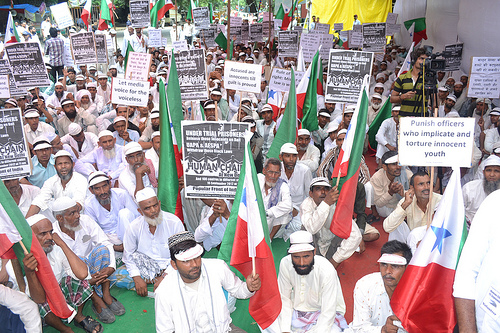
New Delhi, September 16: Hundreds of people on Saturday made a human chain at Jantar Mantar in New Delhi demanding release of under-trial innocent Adivasis, Dalits and Muslims on bail. Popular Front of India had organized the program at the end of its month-long nationwide campaign “Bail Is The Rule; Release The Innocents From Jail” (15th August 2012 -- 15th September 2012).
The human chain started at 11.00 am and lasted for 30 minutes and the participants took oath in the leadership of Popular Front of India Chairman EM Abdur Rahman. “We, the citizens of India, who have joined hands to form this Human Chain, declare our commitment to the democratic and secular values enshrined in the constitution of our country and protected in our legal system. We believe every citizen should be treated innocent unless and until he is found guilty by due process of law. No accused individual should be kept in jail We strongly believe that bail is the rule and jail is an exception. We call up on the government to release the under- trial prisoners of the country on bail. We all pledge to strive together to prevent illegal arrests, to free under trial prisoners, to provide compensation to victims and to withdraw UAPA amendments and all black laws,” they said.
The participants also raised slogans demanding release of innocent Adivasis, Dalits and Muslims on bail. Many family members of victims such as Shozain Kazmi (Son of Ahmed Kazmi), Shakeel Siddiqui (brother of Qateel Siddique) and many others participated in the human chain.
Followed by the human chain a public meeting was held at the place in which various leaders including PFI Chairman EM Abdur Rahman, Human rights activists such as Arundhati Roy, Rona Wilson, SAR Geelani, Dr. Sai Baba, Dr Basheer (IUML), Prof P Koya (NCHRO), Moulana Shahul Baqavi (All India Imams Council), Hafiz Mansoor Ali Khan (SDPI), Zafarul Islam Khan(AIMMM), Kavitha Krishnan (CPI-ML), Aneesus Zaman (Campus Front), Omar Khalid (DSU) and various leaders/activist addressed the public.
Following the meeting a nationwide signature campaign was inaugurated by Human rights activist Arundhati Roy demanding the release of innocents.
Addressing the public, Arundathi Roy said: “thousands of innocent Adivasis in many states of India have been arrested who don’t have a piece of bread to eat. And after the demolition of Babri masjid picking up of Muslim youth began in big scale. I demand that all these innocent political prisoners to be released on bail immediately.”





.jpg)
.jpg)
Comments
Add new comment